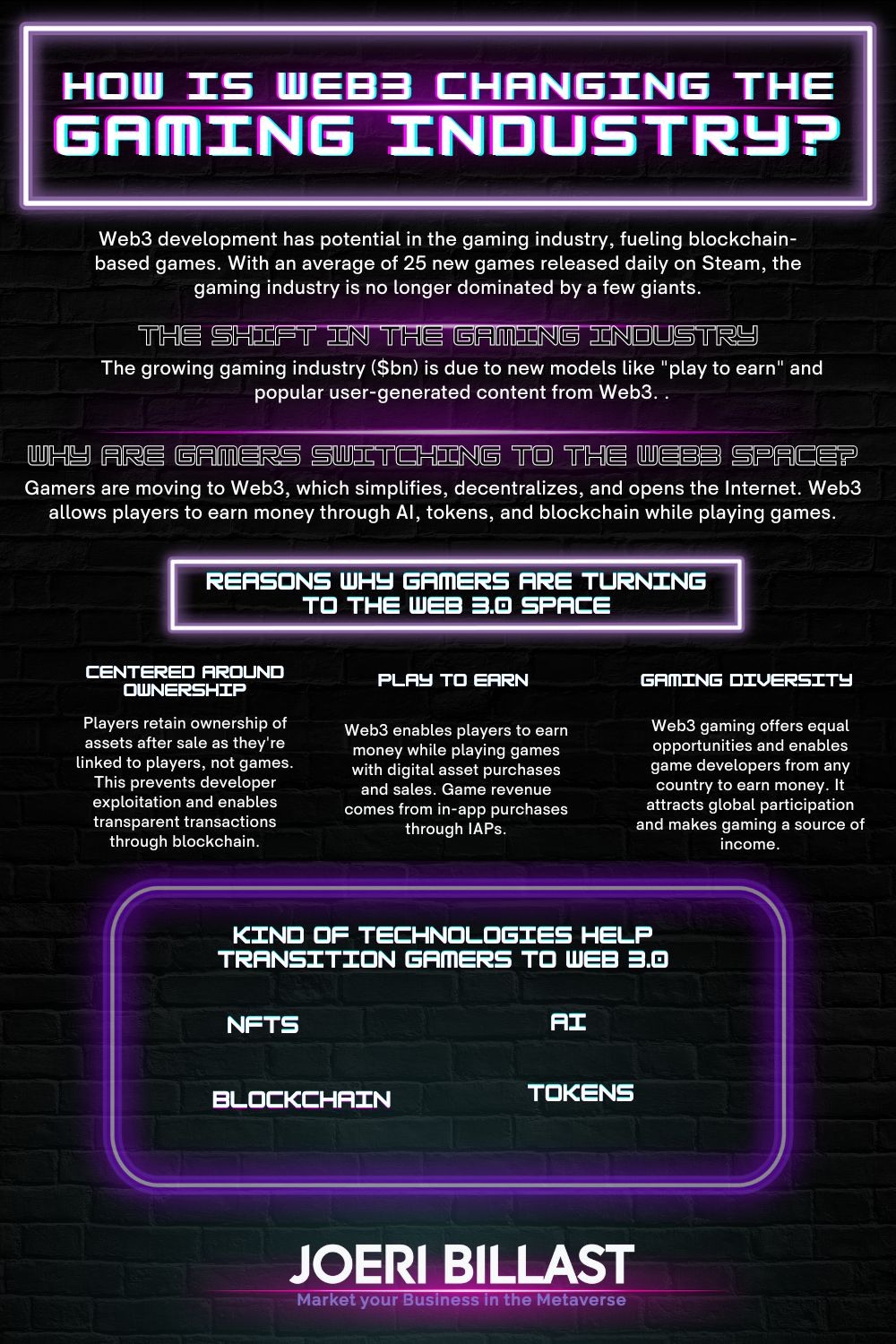The gaming industry is the most potential-holding audience for Web3 development. It is fast-paced and is always demanding innovations to get to a new level. In simple words, Web3 has given the gaming industry a lot of space for growth. Blockchain-based protocols use this gaming space as their foundation. Web3 and its decentralization come in handy the most when we talk about blockchain technology and game creation. To give the entire gaming industry a better gaming experience, Web3 fuels game developers to create blockchain-based games.
You can see the revolution of the gaming industry through the fact that more and more independent gaming studios are being created. There isn't a monopoly in the gaming industry anymore and it is not managed by just a few gaming giants. An average of 25 new games are released on Steam each day.
The shift in the gaming industry.
The multi-billion-dollar gaming industry is growing at a surprising rate. This is due to a large number of individuals getting drawn to new gaming models such as ‘play to earn’. Increased usage of the latest technology in the gaming industry has permanently changed it. As Web3 develops and evolves, the gaming industry also shifts.
Players have started to focus on blockchain-based games rather than video games. With Web3, players now have the option to earn money by playing games. Players can purchase assets within the game and later sell them at their own price to others within the game or outside on the Web3. User-generated content has gained popularity in gaming thanks to Web3.
Let's take modding as an example. Modding is jargon for modifying video games and it has turned out to be very successful for creators and caught the eye of most players. Minecraft modding alone caused more than a billion official downloads and earned a $350m revenue since 2017. Through informal channels, there is also another form of modding which is open-source and free.
A lot of people are now fully invested in this huge change in the gaming market because of the switch of gaming from free-to-play to play-to-earn. There are so many new possibilities in the gaming industry now, the developments in this department are endless. We will be discussing the impact of Web3's blockchain-based gaming on the gaming industry.
Why are gamers switching to the Web3 space?
The aim of Web3 is to simplify, decentralize, and open the Internet. The gaming landscape has changed and the market has been modified forever, all thanks to Artificial Intelligence (AI), tokens, and blockchain. The biggest features allow players to earn actual money while playing games.
Here are a few reasons why gamers are turning to the Web3 space:
- Centered around ownership: Thanks to blockchain technology, you will still have ownership of your assets even after you sell them as it links them to players instead of games. This means that developers can not take advantage of a player's card information because transactions are all completely transparent due to blockchain technology. Blockchain technology will also safeguard investments. You can purchase products within the game through blockchain technology and the asset ownership will be completed through the players once the sale is made.
- Play to Earn: Players can now earn money while playing games on Web3. Players can now utilize their personal funds to buy an item in the game and later have the choice to sell it to another individual inside the game or outside the virtual environment. Most of the game's revenue comes from in-app purchases through in-game IAPs. Players can purchase these in-app items through IAPs, but even though they have paid to use these assets, they do not have any ownership of them in the game. When a player purchases a resource in Web3, the blockchain technology will attach the resource to the player rather than the game, safeguarding the monetary assets players have made and the little assets they have on their records. Gamers can purchase these digital assets and even store them outside of the game.
- Gaming diversity: Web3 gaming gives people equal opportunities for success. Game developers from underdeveloped countries or nations now have the chance to earn money through Web3 gaming. Modelling 3.0's Web concept will catch the eye of people from around the world to take part in gaming and make it a source of income. Web3 is a great opportunity for gamers and it can prove to be more than just a hobby. It can generate revenue for them.

What kind of technologies help transition gamers to Web3?
Certain technologies help transition gamers to Web3. They are listed as follows:
- Blockchain: There are currently 100 million users of blockchain gaming, but this number is expected to increase to two billion users. Users can interact with each other in blockchain games and have immutable and decentralized systems. Gamers will be able to create a single gaming ecosystem from multiple games due to blockchain technology.
- NFTs: Non-Fungible Tokens (NFTs), which are also known as crypto tokens, contain digital information that is locked in a secure blockchain data structure. These tokens can be used for in-app purchases or transferred from wallet to wallet. The latest NFTs can be equipped by players that hold the highest placements on leaderboards. Not all NFTs can be transferable within the gaming platform, only the rarest ones.
- Artificial Intelligence (AI): Artificial Intelligence (AI) combined with Natural Language Processing (NLP) ensures a better understanding of information in human languages for computers and gives better results during tests. The results are quicker and more accurate translations.
- Tokens: Tokens are considered incentives for players that are active in the gaming industry. The gaming community gains a lot if the value of these tokens increases. People will consider these gains as a reason to develop those games even more. Players may sell tokens and then purchase currency in the market.
The gaming industry is facing a drastic change with Web3 and it is flourishing. It is adapting to the modern economic climate using new technology. Web3 is a game-changer for the gaming industry.






